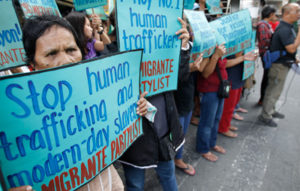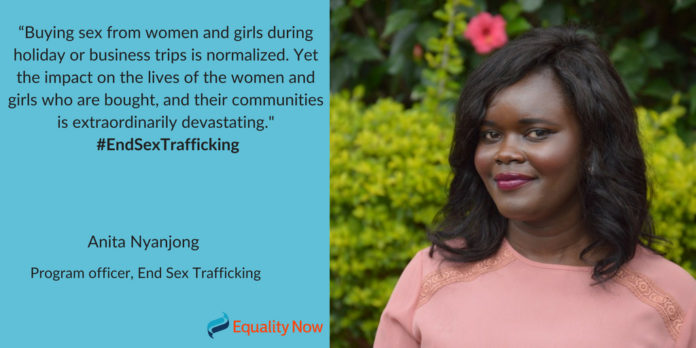By Anita Nyanjong
The World Day against Trafficking in Persons is commemorated each year on 30th July. This day is a constant reminder of the worldwide scourge of trafficking in persons. Millions of men, children, and women end up in the hands of traffickers worldwide, tricked, abused, and forced into, prostitution, bondage, and labor.
Human trafficking for sexual exploitation is one of the most common forms of human trafficking and the fastest growing organized crimes in the world, and an overwhelming majority of victims of the trade are female. It is gendered.
It is the fastest growing criminal enterprise in the world, worth nearly $99 billion each year, and 96% of its victims are women and girls.
The 2018 theme is- “responding to the trafficking of children and young people“
Almost a third of trafficking victims are children, according to the United Nations Office on Drugs and Crime. 20% of all trafficking victims are girls. The demand for younger and younger victims in the prostitution trade means that more girls are becoming victims of sex trafficking.

Protecting young people from trafficking is an important priority, as is ensuring that they are protected throughout their lives. There are greater efforts by governments to address the impact of sex trafficking and prostitution on children. However, despite this, there is little acknowledgment that prostituted adults were often forced or coerced into prostitution through trafficking and other means as children or the particular vulnerabilities of adolescent girls as they fall through protection gaps in policies that focus on children. Governments must take a life stage approach and ensure that laws and policies need to protect both women and children from sex trafficking.
Victims, especially adult women in prostitution, are often prejudged as being responsible for their situation, that they have “chosen” to sell their bodies. This results in moral approaches being employed to “rescue them”, and ensuring that they become “responsible” individuals. We must consider the socio-economic factors that lead to men buying sex, and women and girls socio-economic vulnerabilities. They are not criminals but victims who require protection and support.
Equality Now is working with partners across the world including Malawi and Kenya, to advocate for enactment and implementation of strong laws that protect women and girls and punish perpetrators. We are targeting the roots of the problem – the demand for paid sex – to protect women and girls from trafficking. In addition to laws that punish traffickers, pimps and buyers, we also call on governments to address gender inequality and not treat women and girls as criminals but rather as victims of a crime requiring protection and support.
Human trafficking for sexual exploitation is not confined to specific countries or geographical borders. A country can either be a human trafficking source, transit, or destination or sometimes encompass all the three, like in the case of Malawi which is a source, transit and destination country for trafficking for sexual exploitation from within the country and from other countries.
Traffickers capitalize on the vulnerabilities created by permeable borders, unemployment, illiteracy, poverty and generally a lack of economic opportunities to exploit young girls and women in Malawi.
We believe that effective movements must originate from the ‘experts’ who are women at the frontlines, and who understand the realities in their part of the world. We have listened to women survivors of sex trafficking and sexual exploitation in the context of tourism industry such as Kenya and believe that solutions lie in listening to the voices of women and girls who are survivors.
Kenya is one of the countries with growing sex tourism occurring in the context of a booming tourism industry and increased foreign investment which contributes to the greater movement of people, sex buyers included. For instance, along with the coastline, the beach resorts, historical monuments, and other natural resources are major attractions and attract high numbers of tourists and travelers. It is also rife in other inland areas in the rift valley with its natural attraction.
The sexual exploitation of women and girls in travel and tourism both directly and indirectly fuels sex trafficking. It is a part of the prostitution industry. Demand is created by those who buy sex and results in the trafficking of vulnerable women and girls to meet the demand. It feeds into a global US$99 billion dollar industry where traffickers and pimps make huge profits, fueled by the demand of those who buy sex.
We acknowledge the government’s efforts to address sexual exploitation in travel and tourism but more needs to be done. The government of Kenya has put in place a number of laws and policy frameworks aimed at protecting those most at risk such as the Sexual Offences Act, the Children Act and the Trafficking in Persons Act, as well as the National Plan of Action against the Sexual Exploitation of Children.
The Kenyan Constitution provides for the rights of citizens in accordance with international law and Kenya is a signatory to international law such as the Palermo Protocol and has committed to putting in place measures to achieve the SDGs, which provide for the protection of victims and address gender inequality and discrimination as the root causes leading to sexual exploitation. However, there still remains a lot to be done.
Survivors of sex trafficking are clear that what they have experienced is rape, not forced labor. Therefore, beyond narrations of personal experiences, we need to listen to their perspectives on the solutions – what needs to change in law, policy and practice and what support they need.
Therefore, in addition to laws and policies that target traffickers, pimps and buyers, the Kenyan government enacts strong laws that promote gender equality and eliminate discrimination in all aspects of women and girls’ lives and throughout their lives. We call upon the Kenyan Government to leverage the political will in the SDGs and ensure that no woman or girl is left behind.
Anita Nyanjong is a Program Officer, End Sex Trafficking at Equality Now














